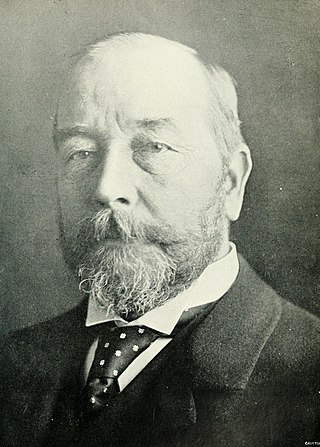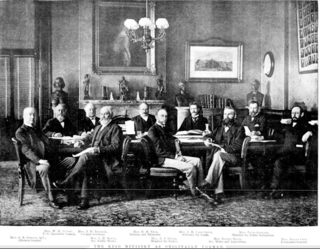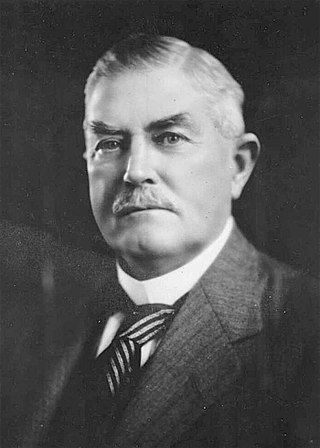Related Research Articles
Members of the New South Wales Legislative Assembly who served in the 52nd parliament held their seats from 1999 to 2003. They were elected at the 2003 state election, and at by-elections. The Speaker was John Murray.

Sydney Smith was an Australian politician. He began his parliamentary career in the New South Wales Legislative Assembly and served as a government minister under Henry Parkes. He transferred to the new House of Representatives after Federation, representing the Division of Macquarie from 1901 to 1906. He served as Postmaster-General in the Reid government from 1904 to 1905.
Warringah was an electoral district of the Legislative Assembly in the Australian state of New South Wales and named after and including the Warringah region of the northeastern suburbs of Sydney. It was created in 1894, when multi-member districts were abolished, and the three member district of St Leonards was divided between Warringah, St Leonards and Willoughby. It was abolished in 1904 as a result of the 1903 New South Wales referendum, which required the number of members of the Legislative Assembly to be reduced from 125 to 90, and was partly replaced by Middle Harbour.

Dugald Thomson was an Australian politician. He campaigned for Federation as a member of the New South Wales Legislative Assembly (1894–1901), and was subsequently elected to the new federal House of Representatives (1901–1910). He served as Minister for Home Affairs in the Reid government from 1904 to 1905.

Francis Clarke was an Australian politician.

John Thomson was an Australian politician. He was a Progressive Party member of the New South Wales Legislative Assembly from 1901 to 1904, representing the Manning electorate. He was then a member of the Australian House of Representatives from 1906 to 1919, representing Cowper for the Protectionist Party and its successors the Commonwealth Liberal Party and Nationalist Party.

Edmund Lonsdale was an Australian politician. Born in Morpeth, New South Wales, he was schooled in Maitland before becoming a bricklayer, builder and contractor. He was also an alderman on Armidale Shire Council.
Members of the New South Wales Legislative Assembly who served in the 34th parliament held their seats from 1944 to 1947. They were elected at the 1944 state election, and at by-elections. The opposition Democratic Party merged into the nascent Liberal Party in late 1944, becoming the New South Wales branch of the new party. The Speaker was Daniel Clyne.
Members of the New South Wales Legislative Assembly who served in the eighth parliament of New South Wales held their seats from 1874 to 1877. The 1874–75 election was held between 8 December 1874 and 12 January 1875 with parliament first meeting on 27 January 1875. There were 72 members elected for 52 single member electorates, 6 two member electorates and 2 four member electorates. During this parliament the number of graduates of Sydney University exceeded 100 and the seat of University of Sydney was created. The maximum term of this parliament was 3 years and the assembly was dissolved after 34 months. Premiers during this parliament were Sir John Robertson 9 February 1875 till 22 March 1877 and from 17 August 1877 and Sir Henry Parkes 22 March 1877 till 17 August 1877. The Speaker was William Arnold until his death on 1 March 1875 and then George Allen.
Members of the New South Wales Legislative Assembly who served in the 25th parliament of New South Wales held their seats from 1920 to 1922. They were elected at the 1920 state election on 20 March 1920. The Speaker was Daniel Levy with the exception of 13–20 December 1921 when he was replaced by Simon Hickey.

The Reid ministry was the 28th ministry of the Colony of New South Wales, and was led by the 12th Premier, George Reid. The title of Premier was widely used to refer to the Leader of Government, but was not a formal position in the government until 1920. Instead the Premier was appointed to another portfolio, usually Colonial Secretary but on this occasion Reid took the portfolio of Colonial Treasurer until July 1899 and then Attorney General.

The 1922 New South Wales state election was held on 25 March 1922. This election was for all of the 90 seats in the 26th New South Wales Legislative Assembly and it was conducted in multiple member constituencies using the Hare Clark single transferable vote. The 25th parliament of New South Wales was dissolved on 17 February 1922 by the Governor, Sir Walter Edward Davidson, on the advice of the Premier James Dooley.
Ellison Wentworth Quirk was an Australian politician. He was an Alderman and member of the New South Wales Legislative Assembly, representing the electorate of Warringah from 1901 to 1904.

The 1901 New South Wales state election was held on 3 July 1901 for all of the 125 seats in the 19th New South Wales Legislative Assembly and it was conducted in single-member constituencies with a first past the post voting system. The Parliamentary Electorates Act of 1893 had conferred the right to vote on every male British subject over 21 years of age who was resident in New South Wales for a year or more. The 19th parliament of New South Wales was dissolved on 11 June 1901 by the Governor, Lord Beauchamp, on the advice of the Premier, John See.

The 1898 New South Wales colonial election was held on 27 July 1898 for all of the 125 seats in the 18th New South Wales Legislative Assembly and it was conducted in single-member constituencies with a first past the post voting system. Section 23 (1) of the Parliamentary Electorates and Elections Act of 1893 conferred a right to vote on 'every male person, being a natural born [British] subject, who shall have resided or had his principal place of abode in New South Wales for a continuous period of one year'. The 18th parliament of New South Wales was dissolved on 8 July 1898 by the Governor, Lord Hampden, on the advice of the Premier, George Reid.
This is a list of candidates for the 1898 New South Wales colonial election. The election was held on 27 July 1898.
The 1904 New South Wales state election involved 90 electoral districts returning one member each. The election was conducted on the basis of a simple majority or first-past-the-post voting system. There were two significant changes from the 1901 election, the first was that women were given the right to vote, which saw an increase in the number of enrolled voters from 345,500 in 1901, to 689,490 in 1904. The second was that as a result of the 1903 New South Wales referendum, the number of members of the Legislative Assembly was reduced from 125 to 90. The combined effect of the changes meant that the average number of enrolled voters per electorate went from 2,764, to 7,661, an increase of 277%. Leichhardt was the only district that was not substantially changed, while The Macquarie and The Murray districts retained nothing but the name.
The 1901 New South Wales state election was for 125 electoral districts, with each district returning one member. The election was conducted on the basis of a simple majority or first-past-the-post voting system. In this election, in 32 electorates the winning candidate received less than 50% of the votes, while 13 were uncontested. The average number of enrolled voters per electorate was 2,764, ranging from Wentworth (1,706) to Willoughby (4,854).
The Hastings and The Macleay, an electoral district of the Legislative Assembly in the Australian state of New South Wales was created in 1894 and abolished in 1920.
Warringah, an electoral district of the Legislative Assembly in the Australian state of New South Wales was created in 1894 and abolished in 1904.
References
- ↑ Green, Antony. "1901 Totals". New South Wales Election Results 1856-2007. Parliament of New South Wales . Retrieved 17 March 2020.
- ↑ Green, Antony. "1901 election candidate index". New South Wales Election Results 1856-2007. Parliament of New South Wales . Retrieved 17 March 2020.
- ↑ "Mr Dugald Thomson". The Australian Star . 16 July 1898. p. 9. Retrieved 1 April 2020– via Trove.